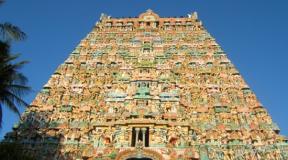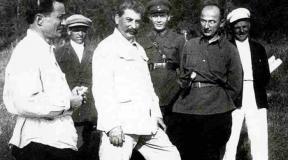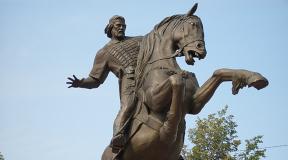The philosophy of the Middle Ages is the most concise. Philosophy of the Middle Ages: briefly. Medieval Arabic philosophy
MAIN PROBLEMS OF THE PHILOSOPHY OF THE MIDDLE AGES
Introduction.
In historical science, the period of the Middle Ages in Western Europe is dated to the 5th-15th centuries. However, in relation to philosophy, such dating is not entirely correct. Medieval European philosophy is Christian philosophy. Christian philosophy began to take shape much earlier. The first Christian philosophers developed their ideas in the 2nd century AD. The philosophy of early Christianity was called apologetics, and its representatives were called apologists, since their writings were aimed at defending and justifying the Christian doctrine.
The boundaries between antiquity and the Middle Ages are blurred and indistinct. Therefore, paradoxical as it may seem, medieval philosophy began earlier than ancient philosophy ended. For several centuries, two ways of philosophizing existed in parallel, mutually influencing each other.
If the ancient philosophers saw essence and existence in an inseparable unity, then, according to Christian philosophy, essence can take place without being (without existence). To become existing (being), an entity must be created by God.
Medieval philosophical thought went through three stages in its development:
1. Patristics(from the Latin pater - father) - works of the church fathers. Initially, the “father of the church” was a spiritual mentor who had a recognized teaching authority. Later, this concept was refined and began to include four features: 1) the sanctity of life; 2) antiquity; 3) orthodoxy of doctrine; 4) official recognition of the church.
2. Scholasticism- a type of religious philosophy, characterized by fundamental subordination to the primacy of theology, the combination of dogmatic premises with rationalistic methods and a special interest in formal logical problems.
3. Mystic- a philosophy that comprehends the religious practice of the unity of man with God, the immersion of the contemplative spirit in the ocean of divine light. If in scholasticism the speculative-logical aspect prevailed, then in mysticism it was contemplative. All mystical teachings gravitate toward irrationalism, intuitionism, deliberate paradox; they express themselves not so much in the language of concepts as in the language of symbols.
In the following chapters, we will take a closer look at the two main stages, and try to identify the problems of that time.
Representatives of medieval philosophy
Before turning to the main problems of medieval philosophy, it is necessary to know the philosophers of that time and their philosophical views.
| Albert the Great | It was through his work that the philosophy and theology of medieval Europe adopted the ideas and methods of Aristotelianism. In addition, Albert's philosophy was strongly influenced by the ideas of Arab philosophers, with many of whom he argued in his works. Albert left a gigantic written legacy - his collected works include 38 volumes, most of which are devoted to philosophy and theology. Among the main works are the Summa on Creations, On the Soul, On the Causes and on the Origin of Everything, Metaphysics, and the Summa of Theology. | |
 | Tertullian | Tertullian had an excellent knowledge of Holy Scripture and Greek authors. 31 works of Tertullian have come down to us, all of his works are devoted to topics of practical importance: the attitude of Christians towards paganism, questions of Christian morality and the refutation of heresies. 14 works known by their titles have not survived. Initially, Tertullian was engaged in apologetics, writing the Apologetic proper and To the Gentiles in 197 and developed a code of Christian morality in the treatises On Spectacles, On Idolatry, On Women's Attire and On the Wife, instructing catechumens in treatises “On Baptism”, “On Prayer” and “On Repentance”, explained in the treatise “On the Removal of Objections of Heretics”. The author of the biography of Tertullian, Blessed Jerome, therefore called him "ardens vir" - "a violent husband." |
 | William of Ockham | According to Occam, the absolute freedom of the Divine will means that in the act of creation it is not bound by anything, not even by ideas. Ockham denies the existence of universals in God; they do not exist in things either. The so-called ideas are nothing but the things themselves produced by God. There are no ideas of species, only ideas of individuals, since individuals are the only reality that exists outside the mind, both Divine and human. The starting point for knowing the world is knowledge about individuals. |
 | Thomas Aquinas | The writings of Thomas Aquinas include: two extensive treatises in the genre of the sum, covering a wide range of topics - "The sum of theology" and "The sum against the pagans" ("The sum of philosophy") discussions on theological and philosophical problems ("Debatable questions" and "Questions on various topics") Commentary on: - several books of the Bible - 12 treatises of Aristotle - "Sentences" of Peter Lombard - treatises of Boethius, - treatises of Pseudo-Dionysius - an anonymous "Book of Causes" a number of short essays on philosophical and religious topics several treatises on alchemy; poetic texts for worship, for example, the work "Ethics", "Debatable Questions" and "Comments" were largely the fruit of his teaching activities, which included, according to the tradition of that time, disputes and reading authoritative texts, accompanied by comments. |
 | Meister Eckhart | The author of sermons and treatises, which have been preserved mainly in the notes of the students. The main theme of his reflections: Deity - the impersonal absolute, standing behind God the Creator. The divinity is incomprehensible and inexpressible, it is " complete purity of the divine essence where there is no movement. Through its self-knowledge, the Deity becomes God. God is eternal being and eternal life. According to Eckhart's concept, a person is able to know God, because in the human soul there is " divine spark”, a particle of the Divine. Man, having muted his will, must passively surrender to God. Then the soul, detached from everything, will ascend to the Divine and in mystical ecstasy, breaking with the earthly, will merge with the divine. Bliss depends on the inner self-activity of a person. |
 | Peter Abelard | According to Abelard, the dialectic must consist in questioning the assertions of authorities, in the autonomy of philosophers, in a critical attitude towards theology. Abelard's views were condemned by the church at the Council of Suasso (1121), and at his verdict, he himself threw his book "Divine Unity and Trinity" into the fire. (In this book, he argued that there is only one and only God the Father, and God the Son and God the Holy Spirit are only manifestations of his power.) In accordance with these beliefs, Abelard believed that the pagans who persecuted Christ, did not commit any sinful actions, as these actions were not in conflict with their beliefs. The ancient philosophers were not sinful, although they were not supporters of Christianity, but acted in accordance with their high moral principles. Abelard questioned the claim of the redemptive mission of Christ, which was not that he took away the sin of Adam and Eve from the human race, but that he was an example of high morality, which should be followed by all mankind. Abelard believed that mankind inherited from Adam and Eve not the ability to sin, but only the ability to repent of it. According to Abelard, a person needs divine grace not for the implementation of good deeds, but as a reward for their implementation. All this was contrary to the then widespread religious dogmatism and was condemned by the Council of Saints (1140) as heresy. |
 | Duns Scott | Duns Scotus is considered the most important philosopher-theologian of the High Middle Ages. He had a significant influence on ecclesiastical and secular thought. Among the doctrines that made Scott famous are such as: "unambiguity of being", where existence is the most abstract concept applicable to everything that exists; formal difference - a way of distinguishing different aspects of the same thing; the idea of concreteness - a property inherent in each individual and endowing it with individuality. Scott also developed a set of arguments for the existence of God and arguments for the Immaculate Conception of the Virgin Mary. |
| Bonaventure | Bonaventure believed that Platonic ideas exist. However, in his opinion, perfect knowledge of ideas is given only to God. Bonaventure treated Saint Augustine with great respect. He also supported Anselm of Canterbury's ontological proof of the existence of God. Attempts to synthesize Christianity with the teachings of Aristotle Bonaventure considered hostile to Christianity. Theology is for Bonaventure the mistress of all secular sciences, which he unites under the general concept of philosophy, and unity with God, to which love leads a person through six stages of knowledge, is the greatest blessing. This is substantiated in detail by him in the scholastic essay "Guide of the soul to God" and in the mystical essay "On the reduction of sciences to theology." The choice of problems in philosophy is given by theology and there are only three metaphysical problems: creation, exemplarism (individuation) and reunion with God through illumination (illumination). According to the teachings of Bonaventure, a person has three eyes: bodily, mental and contemplative; the latter is developed by self-deepening into the soul as a reflection of God, self-abasement, self-denial and sincere prayer. As there were 6 days of creation, so there are 6 degrees of contemplation, followed by the highest good, merging with the Divine. |
The main problems discussed in medieval philosophy include the problem of faith and reason, the proof of the existence of God, the problem of universals.
The problem of the relationship between faith and reason was solved by the authors in different ways. Three variants (theses) of this problem can be formulated:
1. Thesis of Aurelius Augustine: I believe in order to understand. Here the dogma of faith becomes the foundation for rational conclusions.
2. Pierre Abelard's thesis: I understand in order to believe. Here, the truths of faith must receive rational justification and philosophical interpretation. This position leads to the absorption of theology by philosophy.
3. Tertullian's thesis: I believe because it is absurd. This option assumes a discrepancy between reason and faith, leads to the concept of two truths. Such a position leads to a break in philosophy and theology. Tertullian puts forward a position of pure faith, rejects the need for philosophical knowledge, since there is no need for research after Christ. He is credited with the maxim: "I believe because it is absurd."
Justin - philosophy is the sister of religion and can, in its best examples, pose the same problems as religious doctrine.
Scholasticism
The main problems of scholasticism are:
a) the problem of the relationship between knowledge and faith;
b) the problem of the relationship between essence and existence;
c) the problem of the nature and essence of general concepts ("universals").
Three approaches to solving one of the main problems of scholasticism - relationship between knowledge and faith.
1. Knowledge and faith are irreconcilable enemies. They are opposites, incompatible with each other. Philosophy, reason, knowledge are the enemies of religion and faith. Faith does not need any knowledge, any intelligence. It has its own nature, its own basis - "revelation" and "holy scripture". Tertullian speaks directly about this: “After Christ, we do not need any curiosity; after the Gospel no research is needed.”
Faith is faith because it does not need any reasonable justification and evidence. “The Son of God was crucified; we are not ashamed of it, because it is shameful; the son of God died - we fully believe this, because it is absurd. And the buried one is risen; this is true because it is impossible." Hence Tertullian's famous credo: "I believe, because it is absurd." With this approach, philosophers are not only not needed by religion, but on the contrary, "philosophers are the patriarchs of heretics." Wherever a philosopher appears, where he raises rational questions, heretics also appear.
This concept was developed by Tertullian (160-240) and Peter Damiani (1007-1072). It is expressed in apophatic theology, which denies the possibility of knowing God and his manifestations in the real world.
2. Union of knowledge and faith. This concept is represented in cataphatic theology. According to her, the knowledge of God is possible according to the fruits of his creation and the results of intervention in the affairs of the world, therefore, the union of faith and knowledge is possible. However, the union itself was understood differently. Some gave primacy in this alliance to faith - “I believe in order to understand” (St. Augustine, A. Canterbury), others - to knowledge, “I understand in order to believe” (P. Abelard).
3. The theory of dual truth. Its most famous representatives are Averroes (1126-1198) and Siger of Brabant (circa 1235-1282). Its essence lies in the fact that philosophy and theology have different objects of study (one nature, another God), different sources of knowledge (philosophy - reason, religion - revelation) and therefore they have different knowledge and different truths. One truth is philosophical, the other truth is theological. These two truths are equal and independent of each other.
The concept of the union of knowledge and faith is the most widespread. However, this concept turned out to be internally contradictory and difficult to implement in practice.
The idea of relying on reason in solving theological issues was expressed in the 9th century by John Scott Erigena. He considered reason as a criterion for the correct interpretation of "Holy Scripture" and thus laid the foundations of religious rationalism. Its essence is that "everything that is reasonable must be provable by reason." Since God and his activities are rational, they must be provable with the help of reason. Hence the task of religious rationalism is to prove with the help of reason the reasonableness of religious dogmas.
However, this thesis in a hidden form contained its continuation - "everything that is unprovable by reason is unreasonable." From this it turned out that dogmas that cannot be proved by reason are unreasonable. Therefore, when it became clear that the dogmas of religion are unprovable with the help of reason, scholasticism faced a dilemma - either admit that religious dogmas are unreasonable, which is impossible, or find some way out. And this way out was found - religious dogmas were recognized as "superreasonable", i.e. it was argued that these dogmas are reasonable in their divine nature, but inaccessible to human reason.
Thus, in order to avoid accusations of the unreasonableness of religious dogmas, scholasticism was forced to gradually abandon its reliance on reason and move on to substantiate their "superreasonable" nature.
In this regard, the history of scholasticism can be viewed as the history of the gradual demarcation of knowledge and faith. And this demarcation is carried out by the scholastics themselves. Albert the Great recognized the impossibility of a rational proof of the dogmas of the unity and trinity of God, of the incarnation and resurrection. Thomas Aquinas added to them the dogmas of creation in time, of original sin, of the sacrament and purgatory, of the Last Judgment and retribution, Duns Scotus recognized the dogma of "creation from nothing"; and, finally, William of Ockham recognized the impossibility of a rational proof of the existence of God and the unity of his nature. As a result of all this, the union of reason and faith did not take place.
The problem of the relationship between essence and existence posed and solved in scholasticism as a theological problem, i.e. as the problem of the existence of God and the knowledge of his essence. However, the philosophical essence of this problem remained the same. How does the existing world (the world visible, sensually perceived, the world of phenomena, “the world for us”) correlate with the essence of this world, i.e. a world that is not sensually perceived, a world that is comprehended only by the mind (the noumenal world, “the world in itself”), but which is the only true world, forming the essence, the basis of the visible world.
The scholastics solved the problem posed from the standpoint of religious dogma. The existing world (things) is the creation of God. Therefore, the essence of the world (things) is that it (they) is a creation of God.
There was no dispute that God is the cause and essence of the world. The dispute was about whether it is possible to know God himself?
Some believed that, knowing the existing world as a creation of God with the help of feelings and reason, we know the essence of this world and thereby know God. Therefore, the knowledge of God with the help of reason is quite possible. Others, on the contrary, believed that knowledge of the essence of God by man is impossible, and everything that we know about God, we receive directly from him, through revelation. This scholastic dispute is important in two respects.
Firstly, based on it, two main ways of proving the existence of God have developed. The first is evidence from "revelation", when the existence of God is inferred from the authority of "holy scripture" and the works of the "Church Fathers". This is the holy proof of the existence of God. The second way is natural. The existence of God is deduced and proved on the basis of the characteristics of the existing world. These characteristics allegedly give us evidence for the existence of God. Thomas Aquinas follows this path, proving the existence of God: God as the “first cause”, as the “first mover”, God as the absolute goal, as absolute perfection and as absolute necessity.
Secondly, more than a thousand years of searching for the "essence" of things by scholasticism entered the flesh and blood of European philosophy, philosophical thinking. The search for "essence" has acquired an "innate" character. The elucidation of the "essence" and the ways of its cognition has become the central task of European philosophy. Hence the “phenomenal and noumenal” world of I. Kant, hence Hegel’s “Absolute Idea” and “existent being”, hence, as a reaction to the endless search for “essence”, phenomenology, hence “essence and existence” in existentialism.
William of Ockham proposed a fundamentally new approach to solving the problem of essence and existence. The thesis, known as Occam's Razor, states: "Entities should not be multiplied unnecessarily." This means that if science, relying on reason and experience, can explain the essence of a thing, then there is no need to introduce another "speculative" essence to explain it. So, if the law of conservation of energy proves that it does not arise and does not disappear, then there is no need to admit "first causes" and "first movers" to explain the nature and essence of the world. For the old dilemma - knowledge or belief, this meant that as the sphere of knowledge expanded, the sphere of faith would shrink. The separation of knowledge and faith became inevitable.
The problem of the nature and essence of general concepts ("universals") with posed as a theological problem. How to rationally explain one of the dogmas of Christianity - the dogma of the unity and trinity of God? Scholastics find out how the one God relates to his three separate hypostases (God - God the Son - God the Holy Spirit).
However, the philosophical essence of this problem is old - the ratio of the general and the separate (individual). The problem of the origin and nature of general concepts; the problem of the relationship between the sensual and the rational in cognition; problem: how and why do general concepts give us true knowledge about the world?
In answering this question, scholasticism developed two main directions: realism and nominalism. The first direction was based on the ideas of Plato, who believed that the general exists in reality before things in the form of an "idea", the second - on the ideas of Aristotle, according to which the general exists in the things themselves.
Nominalists believed that only single things really exist. The general either does not exist at all (Roscelin, for whom only a word, a name (nomina), to designate homogeneous single things) is common, or it exists, but only in thought, in a concept. The general exists after things and is an abstracted knowledge of individual things. In the words of William of Ockham, this is general - "the knowledge of something general that can be abstracted from many things." This abstract knowledge is fixed in general terms (concepts). Hence the conceptual theory of universals.
The strength of nominalism is the recognition of the existence of separate material things accessible to our knowledge. Its weakness lies in the fact that it cannot explain the process of formation of general concepts that give true knowledge about the world and things.
Realists believed that only the general exists in reality. Everything single, separate only seems to exist (John Scott Erigena). Extreme realism (Anselm of Canterbury) understood the nature of this common in the Platonic spirit. The general as "ideas" existing in the mind of God, before and beyond individual things. These are some ideal "types", standards according to which God creates single things. This explains the closeness of realism to idealism. Moderate realism leaned towards the concept of Aristotle and believed that the common exists in the things themselves and is known with the help of reason.
Thomas Aquinas made an attempt to unite existing views on the nature of universals. He, in essence, reproduced the point of view of Avicenna (980 - 1037), according to which universals exist in three ways: before things as "ideas", as ideal prototypes in the divine mind; in the things themselves, since the universal is the essence of the individual thing; after things in the human mind, which abstracts the general from individual things and fixes it in a concept. But this is more a mechanical combination of different points of view than their synthesis. At present, the problem of universals has acquired practical significance in connection with the development of artificial intelligence.
Patristics
A characteristic feature of medieval philosophical thinking, characteristic of patristics, is that thinkers, in order to confirm their ideas turn to the most authoritative and ancient source - the Bible.
One of the main generic features of patristics as a specific way of philosophizing is decisive change of direction. The ancient sages, Plato or Aristotle (with all due respect to them) could not remain the highest authority for a Christian. The starting point of all theorizing is the text of Holy Scripture (the canon of which finally took shape in the 4th century). The authority of Scripture immeasurably surpasses that of any philosophical text. Scripture is the source of truth and at the same time the ultimate explanatory authority. Therefore, Christian philosophizing can be understood as a philosophical exegesis of a sacred text, and the method of such philosophizing can be understood as a set of ways to interpret this text. The results of the interpretation, in turn, constitute the real content of the philosophical constructions of patristics. The fundamental thesis of patristics (and any Christian philosophizing) says: the truth is contained in Scripture, and the task of the theologian ("true philosopher") is to correctly understand and explain it. It was on these paths that Christian theology took shape, first of all, as a religious-philosophical hermeneutics.
Patristics will be the direct successor of the apostolic tradition, which has the highest authority after the Old Testament. The philosophy created by the apostolic tradition is the first in time in Christianity. And due to the traditionalism of the thinking of the representatives of patristics, it is considered as a prototype of any future philosophizing and its classical model. Based on this, they build their writings as an explanation of certain provisions of the Old and New Testaments.
A feature of the writings of the church fathers of the patristic period will be that, along with knowledge of the texts of Holy Scripture, they reflect all the richness and diversity of ancient philosophy. This is explained by the fact that the creators of patristic philosophical literature were the most educated people of their time. Patristics created a tradition that found its continuation in scholasticism. This makes it possible to consider patristics and scholasticism as phenomena of the same order, firstly, due to their common way of philosophizing, and secondly, due to reliance on the same principles that mediate the content of philosophical writings. These principles include:
· theocentrism- recognition as the source of all things God;
· creationism- recognition that God created everything out of nothing;
· providentialism- recognition that God rules over everything;
· personalism- recognition that a person is a “person”, created by God in his own image and endowed with a conscience;
· revolutionism- recognition that the most reliable way of knowing the most important truths for a person is to comprehend the meaning of Holy Scripture.
At the stage of patristics, such fathers of the Christian Church made a great contribution to the development of philosophy, such as:
Tertullian (160 - 220)
Origen (about 185 - 253/254)
Cyprian of Carthage (after 200 - 258)
Eusebius Pamphilus (about 260 - 339)
Athanasius the Great (295 - 373)
Gregory the Theologian (Nazianzen) (329/330 - 390)
Don't forget that
Basil the Great (about 330 - 379)
Ambrose of Milan (333/334 - 397)
Gregory of Nyssa (335 - after 394)
Hieronymus of Stridon (347 - 419/420)
Augustine the Blessed (354 - 430) and others.
The range of problems that interested the representatives of patristics was wide. In fact, all the problems of ancient philosophy were comprehended in one way or another by the fathers of the Christian church. And yet, the problem of man and his structure in the world remained in the foreground. At the same time, if the representatives of Cynicism, Epicureanism and Stoicism placed the duty of organizing the world on the individual and saw in her activity a means for this, then Christian philosophers made the arrangement of man in the world dependent on God. Human activity and freedom were subordinated to the will of the Almighty. The volitional efforts of people and their activities began to be viewed through the prism of their conformity to divine institutions. Responsibility for what happens in the world is transferred outside the world. “Judge not, lest you be judged,” we read in the Bible. Responsibility to people is mediated by responsibility to God. It is before God that sinners will have to answer.
Solving the basic problem of man's relationship to the outside world, to God and other people required a philosophical analysis and other problems. Essential here was the problem of the relationship between knowledge and faith.
It is clear that knowledge is the acceptance of something by virtue of justification and evidence, that is, indirectly and out of necessity, while faith is the acceptance of something apart from any justification and evidence, that is, directly and freely. Believing and knowing are completely different things. Religion is based on faith, philosophy is based on knowledge, and therefore the difference between them is also obvious. Since the Middle Ages is the era of the unconditional ideological dominance of Christianity in Europe, the problem was the possibility of applying philosophical knowledge to religious faith. There could be no question of any priority of philosophy, since the primacy of religion was self-evident. Therefore, it was only necessary to find out whether philosophy could be at least to some extent compatible with religion and therefore it should be left, making it a prop of faith, a “servant of theology” or, on the contrary, it was necessary to reject any philosophizing altogether, as a harmful and ungodly occupation.
Faith was given priority. At the same time, the authority of knowledge was quite high. At the same time, knowledge was often seen as a means to strengthen faith. Another important problem discussed during the patristic period and later is the problem of free will. At the same time, some medieval philosophers denied free will, others allowed it, but limited it to the possible intervention of God, others defended the idea that people are free in their will, but the world is not free from the will of God. People, incompletely comprehending the world, can be mistaken and sin. Free will is seen as the source of sin. Knowledge of the world created by God can deliver from sin.
Aurelius Augustine is the greatest Christian thinker of the patristic period. In his works, he passionately condemns various heretical teachings - Gnosticism, Manichaeism and others. Augustine made God the center of philosophical thought. God is primary, hence it follows that the soul surpasses the body, the will over the mind. God is the highest essence, only his existence follows from his own nature, everything else necessarily does not exist. He is the only one whose existence is independent, everything else exists only due to the divine will. According to Augustine, the world as a free act of God is a rational creation. God created it on the basis of his own idea. Christian Platonism was an Augustian version of Plato's doctrine of ideas, which was understood in a theological and personalistic spirit. In God is hidden the ideal pattern of the real world. Both Plato and Augustine had 2 worlds: the ideal in God and the real in the world and space.
one). Time is created by God.
2). God dwells in eternity, which is the absence of time.
3). The past and the future, as such, do not exist, and the present has no duration.
4). Three times exist only in our soul: the present of the past is memory; the present of the present is direct contemplation; the present of the future is its expectation
5). We also measure time only in our soul.
Another widely discussed set of problems related to data. It is important to note that one of them was the problem of good and evil in the world. Many Christian philosophers of the patristic period believed that evil in the world has its source in the affairs of people, which are the realization of their free will, afflicted with delusions. Other thinkers saw the source of evil in the machinations of the devil.
It is important to know that much attention was paid by Christian philosophers of the patristic period to the propaganda of the precepts of religious morality. The works devoted to this amaze with the depth of penetration into the spiritual world of man, the knowledge of human passions and desires. It is worth saying that all-pervading humanism is characteristic of these works.
In their writings, the Church Fathers sought to give specific advice to those who sought to avoid sin and be saved from the wrath of God.
Anthological problems and problems of the theory of knowledge were touched upon in the works of Christian philosophers of the period of patristics. Christian thinkers do not doubt the reality of the existence of the world and recognize the usefulness of its knowledge, since in the course of knowledge the greatness of the creator will awaken.
Mystic
Consideration of medieval philosophy will not be complete if we ignore one more direction of Christian thought - mysticism . As already noted, its origins go to the spiritual quest of the Church Fathers, who believed that the highest being can be known only on the basis of mystical experience, i.e. direct and immediate contact with God.
A prominent representative of the mystical branch of medieval philosophy was Bernard of Clairvaux (1091 - 1153), who rejected the rational ways of comprehending the deity inherent in scholasticism, preferring feeling, intuition. Being a well-educated man, familiar with ancient culture, the works of Augustine the Blessed, he, nevertheless, emphasized his indifference to philosophy, considering the Holy Scripture as the main source of his ideas.
Since it is not reason that is needed to communicate with God, but love, humility and attachment of the human soul to the Creator, the abbot of the monastery in Clairvaux elevated asceticism and asceticism to the rank of a way of life. The first step on the path to God is humility, humility, with the help of which a person realizes his imperfection and limitation before the Creator. The second is sympathy, the third is the contemplation of the truth, which brings him into a state of mystical ecstasy, complete self-forgetfulness and likeness to God.
The most important mystic of the 13th century was Giovanni Fidanza (1217-1274), better known as Bonaventure ("Good Coming"). In his most famous work, The Guide of the Soul to God, a member of the Franciscan monastic order, a teacher at the University of Paris, after death canonized as a saint and declared one of the five greatest teachers of the Catholic Church, wrote that the knowledge of God is carried out not through the study of the external world, but through knowledge of one's own soul. As we move towards the goal, the soul must work, performing repentance, prayers, and merciful deeds. Under this condition, consisting of memory, reason and will, the human spirit is able to see the “trace of God” in every line of the universe and come closer to Him. Thus, in Bonaventure, faith acts as a teacher of reason.
The crisis of scholastic thought in the 14th-15th centuries was accompanied by an increase in the influence of mystical teachings, which, like heresies, expressed a kind of protest against the orders prevailing in society and the church.
The most famous mystic of this period was a Dominican monk who taught in Paris, Strasbourg and Cologne. Johann Eckhart (c.1260 - 1327), who received the nickname "Meister", i.e. "master". He argued the impossibility of knowing God by means of the mind, opposing the latter to the “spark of God” located in the human soul, which is the organ of mystical contemplation. In order for the latter to become possible, a person needs to renounce the external: “... detachment is the best, because it purifies the soul, clears the conscience, ignites the heart and awakens the spirit, gives speed to desires; it surpasses the virtues: for it gives us the knowledge of God; separates from the creature and unites the soul with God.
The goal of the mystical life, according to Meister, is in union with God, which requires sincere repentance and cleansing from sins. At the same time, evil and sin are interpreted by the thinker in a peculiar way. God deliberately tempts man, plunging into sins those for whom he has ordained great deeds. The Fall brings up humility, and forgiveness binds more closely to God. Thus, according to Eckhart's views, evil in the absolute sense does not exist, for it serves the fulfillment of divine purposes.
Since God is not a personality for him, but is dissolved in the world, being present at every point of it, there is no need to address him with prayer, perform rituals and sacraments. And the church, as a cumbersome structure that has lost its spirituality, becomes superfluous. Such unorthodox views of the mystic philosopher caused a negative reaction from the official authorities, and after the death of Meister Eckhart, his teaching was declared false by papal decree.
Conclusion
Medieval theological philosophy was distinguished by its self-contained nature, traditionalism, turning to the past, isolation from the real world, militancy, dogmatism, edification, teaching.
The following main features of medieval theological philosophy can be distinguished:
Theocentrism (the main cause of all things, the highest reality, the main subject of philosophical research was God);
Little attention was paid to the study of the cosmos itself, nature, and the phenomena of the surrounding world, since they were considered the creation of God;
Dominated by dogmas (truths that do not need proof) about the creation (of everything by God) and the revelation (of God about Himself - in the Bible);
· the contradiction between materialism and idealism is smoothed out;
Man stood out from nature and was declared a creation of God, standing above nature (the divine essence of man was emphasized);
· proclaimed the principle of free will of man within the framework of divine predestination;
· the idea was put forward of the resurrection of a person from the dead (both soul and body) in the future with charitable behavior;
· a dogma was put forward about the salvation of the surrounding world and humanity through the incarnation of God in the human body - Jesus Christ (God's incarnation) and Jesus Christ taking upon Himself the sins of all mankind;
· the world was considered knowable through the concept of God, which can be realized through faith in God.
The significance of medieval theological philosophy for the subsequent development of philosophy is that it:
became a link between ancient philosophy and the philosophy of the Renaissance and modern times;
· retained and developed a number of ancient philosophical ideas, since it arose on the basis of the ancient philosophy of Christian teaching;
· contributed to the division of philosophy into new spheres (in addition to ontology, which completely merged with ancient philosophy, epistemology stood out);
· contributed to the division of idealism into objective and subjective;
laid the foundation for the emergence in the future of empirical (Bacon, Hobbes, Locke) and rationalistic (Descartes) areas of philosophy as the results of the practice of nominalists, respectively, to rely on experience (empiricism) and increased interest in the problem of self-consciousness (I am a concept, rationalism);
aroused interest in understanding the historical process;
· put forward the idea of optimism, expressed in the belief in the victory of good over evil and in the resurrection.
Dictionary
Apologetics- 1) Tertullian's scientific presentation of the proofs of the truth and the divine source of the Christian religion. 2) science, the task of which is to prove the truth of Christian teaching and its divinity, as well as to defend the Christian faith.
Apophatic theology- a theology that seeks to adequately express the transcendence of God by consistently denying all of his attributes and designations, eliminating one by one the ideas and concepts related to him ( For example , O god it is forbidden to tell not only then , what his No , but and then , what he there is , for he on that side being ) . Apophatic theology was developed by Pseudo-Dionysius Areo-pagite; v medium century supplemented by catalytic theology.
Epistemology– Theory of knowledge; engaged in the study of the emergence, composition and limits of human knowledge.
Dogmatism- in a broad sense - the tendency to follow dogma and the inability to question what you believe.
Cataphatic theology
catechumens– In the ancient church, catechumens were instructed in the form of a summary of the doctrine, formulated in a creed, which they memorized. The assimilation of the creed was the final moment in the preparation of catechumens, preceding their acceptance of baptism, after which they were admitted to the sacrament of communion. Usually, the first communion was timed to coincide with the Easter holiday, when the catechumens put on white clothes, which were not removed throughout the entire Easter week. Those who fell away from the Christian faith also passed the proclamation; in this case, the catechumens had to prove the sincerity of their repentance in order to return to the bosom of the church.
Cynicism- one of the most significant Socratic philosophical schools.
Mystic- A science that sought the hidden meaning in the sacred scriptures and rites of faith; account of the mysterious, enigmatic, supernatural; a special disposition of the soul to the impressions of the mysterious; a doctrine that recognizes religious objects as accessible to external senses.
Ontology- the doctrine of being as such, a branch of philosophy that studies the fundamental principles of being.
Scholasticism- a type of religious philosophy, characterized by fundamental subordination to the primacy of theology, the combination of dogmatic premises with rationalistic methods and a special interest in formal logical problems; received the most complete development and dominance in Western Europe in the Middle Ages.
Theology- a speculative doctrine of God, based on Revelation, that is, the divine Word, embodied in the sacred texts of theistic religions (in Judaism - the Torah, in Christianity - the Bible, in Islam - the Koran).
Theocentrism- a theological concept according to which God, understood as an absolute, perfect being and the highest good, is the source of all being and good. Imitation and likeness to God is considered as the highest goal and the main meaning of human life, and honoring God and serving him as the basis of morality.
Empiricism- one of the most important trends in the philosophy of modern times, arguing that the source of reliable knowledge is only sensory experience, and thinking, reason can only combine the material delivered by the senses, but do not bring anything new into it.
Renaissance (Renaissance) - (French Renaissance, Italian Rinascimento), an era in the cultural and ideological development of a number of countries in Western and Central Europe, as well as some countries in Eastern Europe.
Bibliography
1. Bolotov V.V. Lectures on the history of the ancient church / V.V. Bolotov. - St. Petersburg, 1907-1917; Moscow, 1994.
2. Dictionary foreign words , entered v compound Russian language .- Chudinov A . H ., 1910.
3. Explanatory dictionary of the Russian language S.I. Ozhegova and N.Yu. Shvedova.
4. Collegiate dictionary . 2009.
5. Mayorov G.G. Formation of medieval philosophy. Latin patristics / G.G. Mayorov. - Moscow, 1979. - 524 pages.
6.B.C. Stepin. Philosophy: textbook. manual for students of higher educational institutions / B.C. Stepin [and others]; under the general editorship of Ya. S. Yaskevich. - Minsk; RIVSH, 2006. - 624 pages.
7. Big Encyclopedic Dictionary: In 2 volumes / Editor-in-Chief A.M. Prokhorov. - Moscow: Soviet Encyclopedia, 1991. Volume 2.
8. Encyclopedic Dictionary of Brockhaus and Efron: in 86 volumes (82 volumes and 4 additional). - St. Petersburg, 1890-1907.
9. Big Encyclopedic Dictionary: In 2 volumes / Editor-in-Chief A.M. Prokhorov. - Moscow: Soviet Encyclopedia, 1991. Volume 1.
10. Stolyarov A.A. Patristics. The concept of patristics and its main features: History of Philosophy. West-Russia-East. Book one. Philosophy of antiquity and the Middle Ages / A.A. Stolyarov - Moscow: Greek-Latin cabinet, 1995 - 452 pages.
11. Philosophy: Encyclopedic Dictionary. - M.: Gardariki. Edited by A.A. Ivin. 2004.
12. « Art . Modern illustrated encyclopedia .» Under ed . prof . Gorkin A . P .; M . : Rosman ; 2007.
13. Philosophical encyclopedic dictionary. - Moscow: Soviet Encyclopedia. Ch. editors: L. F. Ilyichev, P. N. Fedoseev, S. M. Kovalev, V. G. Panov. 1983.
2. The problem of reason and faith / the teachings of Augustine /
3. Thomas Aquinas - a systematizer of medieval scholasticism
1. Features of medieval philosophy
Philosophical ideas in the Middle Ages were most often dressed in religious clothes. Strictly speaking, religion is not philosophy. Religion is obedience to God, a supernatural connection between man and God. Religion is characterized by miracles, unbridled belief in dogmas. In philosophy, both are questioned. At the same time, it is impossible not to see a certain similarity between religion and philosophy. As we have seen in the analysis of the views of Plato and Aristotle, the theme of God is not alien to philosophy. The search for the one very often leads to the theme of God. Religious views, as well as any other views, always contain philosophical ideas. It is from this position that we consider Christianity.
Medieval theological philosophy is the leading philosophical trend, widespread in Europe in the 5th - 16th centuries, which recognized God as the highest existing principle, and the entire surrounding world - His creations. Theological philosophy began to emerge in the Roman Empire in the 1st - 5th centuries. AD on the basis of early Christianity, heresies and ancient philosophy and reached its peak in the 5th - 13th centuries. AD (in the period between the collapse of the Western Roman Empire (476) and the beginning of the Renaissance.
The most prominent representatives of medieval theological philosophy were: Tertullian of Carthage (160−220), Augustus the Blessed (354−430), Boethius (480−524), Albert the Great (1193−1280); Thomas Aquinas (1225-1274), Anselm of Canterbury (1033-1109), Pierre Abelard (1079-1142), William of Ockham (1285-1349), Nicholas of Hautecourt (XIV century).
The Middle Ages are called "dark", "gloomy". The attitude towards medieval culture is ambivalent: from recognizing it as rude and inhuman to glorifying it for its religious and mystical impulses. "Could the Middle Ages be a continuous hell in which humanity has lived for a thousand years and from which this poor humanity has learned the Renaissance?" - Academician N.I. Konrad asked a question. And he answered: "Thinking like that means, first of all, underestimating a person. Gothic architecture, radiant poetry of troubadours, chivalric romance, cheerful folk farces, exciting spectacles - mysteries and miracles ... The Middle Ages is one of the great eras in the history of mankind."
In historical science, the period of the Middle Ages in Western Europe is dated to the 5th-15th centuries. However, in relation to philosophy, such dating is not entirely correct. Medieval European philosophy is Christian philosophy. Christian philosophy began to take shape much earlier. The first Christian philosophers developed their ideas in the 2nd century BC. n. e. The philosophy of early Christianity was called apologetics, and its representatives were called apologists, since their writings were aimed at defending and justifying the Christian doctrine.
In medieval philosophy, there was an acute dispute between spirit and matter, which led to a dispute between realists and nominalists. The dispute was about the nature of universals, that is, about the nature of general concepts, whether general concepts are secondary, that is, the product of the activity of thinking, or whether they are primary, real, exist independently.
The boundaries between antiquity and the Middle Ages are blurred and indistinct. Therefore, paradoxical as it may seem, medieval philosophy began earlier than ancient philosophy ended. For several centuries, two ways of philosophizing existed in parallel, mutually influencing each other.
Features of the style of philosophical thinking of the Middle Ages:
1. If the ancient worldview was cosmocentric, then the medieval one was theocentric. The reality that determines everything that exists in the world, for Christianity is not nature, the cosmos, but God. God is a person who exists above this world.
2. The originality of the philosophical thinking of the Middle Ages was in its close connection with religion. Church dogma was the starting point and basis of philosophical thinking. The content of philosophical thought acquired a religious form.
3. The idea of the real existence of a supernatural principle (God) makes one look at the world, the meaning of history, human goals and values from a special angle. The basis of the medieval worldview is the idea of creation (the doctrine of the creation of the world by God from nothing - creationism).
Christianity brought into the philosophical environment the idea of the linearity of history. History moves forward to the Day of Judgment. History is understood as a manifestation of the will of God, as the implementation of a predetermined divine plan for the salvation of man (providentialism).
Christian philosophy seeks to comprehend the internal personal mechanisms of evaluation - conscience, religious motive, self-consciousness. The orientation of a person's whole life to the salvation of the soul is a new value preached by Christianity.
4. Philosophical thinking of the Middle Ages was retrospective, turned to the past. For the medieval consciousness, "the older, the more authentic, the more authentic, the more true."
5. The style of philosophical thinking of the Middle Ages was distinguished by traditionalism. For a medieval philosopher, any form of innovation was considered a sign of pride, therefore, excluding subjectivity from the creative process as much as possible, he had to adhere to the established model, canon, tradition. It was not creativity and originality of thought that was valued, but erudition and adherence to traditions.
6. The philosophical thinking of the Middle Ages was authoritarian, relied on authorities. The most authoritative source is the Bible. The medieval philosopher turns to biblical authority for confirmation of his opinion.
7. Philosophy of the Middle Ages - commentary philosophy. A significant part of medieval writings is written in the form of a commentary. The comments were mainly on the Holy Scriptures. The preference given in religion to authority, a statement consecrated by tradition, over an opinion expressed on one's own behalf, prompted similar behavior in the field of philosophical creativity. The leading genre of philosophical literature in the Middle Ages was the genre of comments.
8. As a feature, the exegetical nature of medieval philosophizing should be noted. For a medieval thinker, the starting point for theorizing is the text of Holy Scripture. This text is the source of truth and the ultimate explanatory instance. The thinker sets as his task not the analysis and criticism of the text, but only its interpretation. The text, consecrated by tradition, in which not a word can be changed, arbitrarily rules the thought of the philosopher, sets its limit and measure. Therefore, Christian philosophizing can be understood as a philosophical exegesis (interpretation) of a sacred text. The philosophy of the Middle Ages is the philosophy of the text.
9. The style of philosophical thinking of the Middle Ages is distinguished by the desire for impersonality. Many works of this era have come down to us anonymously. The medieval philosopher does not speak in his own name, he argues in the name of "Christian philosophy."
10. Didacticism (teaching, edification) was inherent in the philosophical thinking of the Middle Ages. Almost all the famous thinkers of that time were either preachers or teachers of theological schools. Hence, as a rule, the "teaching", instructive character of philosophical systems.
11. Medieval philosophy, in contrast to ancient philosophy, distinguishes:
- being (existence) - existence;
−essence − essence.
Existence (being, existence) shows whether there is a thing at all (that is, it exists or does not exist). Essence (essence) characterizes a thing.
If the ancient philosophers saw essence and existence in an inseparable unity, then, according to Christian philosophy, essence can take place without being (without existence). To become existing (being), an entity must be created by God.
Medieval philosophical thought went through three stages in its development:
1. Patristics (lat. Pater - father) - works of the Church Fathers.
Initially, the "father of the church" was a spiritual mentor with recognized teaching authority. Later, this concept was refined and began to include four features: 1) the sanctity of life; 2) antiquity; 3) orthodoxy of doctrine; 4) official recognition of the church.
In the works written by the Church Fathers, the foundations of Christian dogmas were laid. True philosophy, from the point of view of the Church Fathers, is identical with theology, faith always takes precedence over reason, and truth is the truth of Revelation. According to the role it played in society, patristics is divided into apologetic and systematic. According to the linguistic criterion - into Greek and Latin, or (which is somewhat more conditional) into Western and Eastern. Systematics prevailed in the East, apologetics prevailed in the West.
The pinnacle of Latin patristics is the work of Aurelius Augustine, the classics of Greek patristics are represented by Basil the Great, Gregory of Nazianzus and Gregory of Nyssa.
One of the main issues of patristics was the problem of the relationship between faith and knowledge, religion and philosophy. It is clear that knowledge is the acceptance of something by virtue of justification and evidence, that is, indirectly and out of necessity, while faith is the acceptance of something apart from any justification and evidence, that is, directly and freely. Believing and knowing are completely different things. Religion is based on faith, philosophy is based on knowledge, and therefore the difference between them is also obvious. Since the Middle Ages is the era of the unconditional ideological dominance of Christianity in Europe, the problem was the possibility of applying philosophical knowledge to religious faith. There could be no question of any priority of philosophy, since the primacy of religion was self-evident. Therefore, it was only necessary to find out whether philosophy could be at least to some extent compatible with religion, and therefore it should be left, making it a support of faith, a "servant of theology" or, on the contrary, it was necessary to reject any philosophizing altogether, as an occupation harmful and ungodly.
Philosophy briefly and clearly: PHILOSOPHY OF THE MIDDLE AGES. Everything basic and most important in philosophy: in a short text: MEDIEVAL PHILOSOPHY. Answers to basic questions, philosophical concepts, history of philosophy, directions, schools and philosophers.
FORMATION OF MEDIEVAL PHILOSOPHY
For philosophy, the Middle Ages was a period when the purpose and nature of philosophizing changed. The transition from polytheism to monotheistic religion was coming to an end. Such a religion required the acceptance of a whole series of new "truths."
In the countries of Western Europe that arose as a result of the collapse of the Roman Empire, Christianity was such. It originated several centuries BC as a heretical movement in Judaism, then finally departed from it, began to gain more and more importance in the spiritual life of many countries and was recognized as the official state religion during the reign of Emperor Constantine the Great (324 AD). e.). The establishment of an alliance of secular power with Christianity strengthened the church organization in political, economic, and also ideological respects.
On the one hand, the leading representatives of the Christian religion felt the need for a philosophical substantiation of their initial positions (primarily the doctrine of monotheism); from the once negative assessments of the “wise men” and their teachings, they increasingly began to turn to their provisions that could supplement or reinforce certain truths of religion (Titus Flavius Clement, Origen). On the other hand, philosophers were more and more oriented towards one or another attitude of Christianity, sometimes coinciding and supplementing (especially in the moral and ethical sphere) their speculative or, perhaps, insufficiently substantiated statements by life experience; the cosmological ideas of philosophers sometimes had the ten "final cause", about the "form of forms", etc., and the doctrine of the Christian religion about the immaterial (and in this sense, "immaterial") Absolute, or God, could provide a starting point for new philosophical reflections . So the philosophy of the Middle Ages was far from always under the direct dictates of theology, acting allegedly in the role of a “servant of theology” imposed on it.
The conceptual apparatus of religion began to intensively penetrate into philosophy; sometimes it was difficult to distinguish between these two different forms of worldview; received the basis for the existence of the term "religious philosophy". Philosophy did not cease to develop progressively in the Middle Ages, contributing to shifts in the sphere of culture, including religion. However, in comparison with ancient philosophy, there were already other themes in the development of its problems and its constraint by external factors (this happened most clearly in later times, when the church came to the Inquisition). And the fact that the tendency towards the union of philosophy and theology, towards their interaction, manifested itself at the end of antiquity - from the centuries. n. e., speaks of the transient nature of that gross violence of the church, which she later undertook in relation to philosophical dissent. The existence, even today, of such a widespread trend in Western Europe as neo-Thomism, one of the central ideas of which is the union of theology and philosophy, testifies to the same.
In the philosophy of the Middle Ages, two periods are distinguished, called "patristics" (IV-VIII centuries) and "scholasticism" (VI-XV centuries).
Titus Flavius Clement.
NOMINALISM AND REALISM IN THE PHILOSOPHY OF THE MIDDLE AGES
Titus Flavius Clement (Clement of Alexandria) (c. 150-219 AD) was one of the largest representatives of "apologetics". In his writings, a line was clearly marked for an alliance with "Hellenic philosophy", which, in his opinion, was closer to Christianity than Judaism. Clement discovered in philosophy those aspects that could be used by theologians. It is to him that the position belongs that philosophy should be the servant of theology. “In philosophy,” he pointed out, “the method of rational proof is especially useful. In religion, faith still serves as the sensory path to God. But faith alone is not always reliable. It will be stronger if it is supplemented with logical proofs.” “With the help of rational knowledge,” he pointed out, “we deepen and clarify faith. Such knowledge is capable of bringing faith to the state of conscious religiosity. Clement of Alexandria was the first in the history of Christianity to formulate the principle of harmony between faith and reason (of course, such a position actually meant the subordination of reason to faith, but it went beyond the Tertullian "I believe because it is absurd").
A distinctive feature of medieval scholasticism was the sharp struggle between realism and nominalism, stretching for several centuries in clarifying the question of whether general concepts have real content.
Representatives of realism believe that not single things have true reality, but only general concepts - universals. Hence the name of this direction, which does not coincide with the modern meaning of the concept of "realism". Previously, they argued, there was a “house in general”, as a kind of idea of a house, and then there were individual, specific houses as a product of the general idea of a house. It is easy to see here the powerful influence of Plato's doctrine of ideas. The supporters of realism include Anselm of Canterbury, Thomas Aquinas and others.
Another branch of medieval scholasticism, hostile to realism, nominalism, insisted on the reality of singular things, considering universals to be mere copies or names that people assign to things. There is no “house in general”, there is a specific house or their sum, and the name is given by people in order to distinguish one object from another. The supporters of nominalism include Rascelin, Ockham, and others.
Behind this dispute, an extremely important philosophical problem was hidden, what precedes what: objectively existing, sensually perceived things to general ideas (nominalism) or, conversely, ideas to things (realism), whether our knowledge moves from sensations to concepts or from concepts to things. In modern times, this dispute continued in the struggle between empiricism and rationalism.
......................................................
Philosophy of S. Bulgakov.
The world, according to the teachings of Bulgakov, is such a creation, the basis of which is a special, ideal, divine principle, called Hagia Sophia. Therefore, the world as a whole deserves not a negative, but a positive attitude towards itself. Divine is not only the other world, but also the earthly life. A distinctive feature of B.- the comprehensive development of that component of the philosophy of unity, which Solovyov calls sophiology, the doctrine of the ideality of being. The main feature of his teachings- the desire to approve the idea of perfection, beauty, divinity of nature and man.
Medieval philosophy covers the period ~ 5th to 15th centuries. At this time, a feudal society (serfdom) arose. The clergy played a significant role.
The early Middle Ages were characterized by the rise of Christianity. Under the conditions of the strict dictatorship of the church and state power, philosophy was declared a servant of theology, which had to use its rational apparatus to confirm the tenets of Christianity. This philosophy was called "scholasticism" (it was based on the formal logic of Aristotle). During this period of time, much attention is paid to God in philosophy.
Church, religion are natural manifestations of social life, but their absolute dominance contributes to the successful development of philosophy and culture as a whole. Philosophers were able to do their job only by combining it with their activities as priests, abbots, bishops, and so on. Philosophy could develop only within the walls of church and monastic schools. It lost the status of an independent field of knowledge, taking the form religious philosophy and found herself in the position of "servant of theology."
The downgrading of the social status of philosophy, its complete dependence on religion was reflected in its content, its ontology, anthropology, epistemology.
Ontology was reduced to substantiating the idea that the basis, the root cause of everything that exists is God. Moreover, God, as an omnipotent being, is not only the creator of the world and man, he is also the constant leader of all life. Thus, from the point of view of its doctrine of being, medieval philosophy was philosophy of theocentrism.
Anthropology- the doctrine of man, according to which man is not only created by God, but also similar to him. To overcome his sinfulness, to save himself from the wiles of the devil, a person needs constant, from birth to death, the support of religion, the church. (The nature of man is dual: he has not only a soul, but also a body; not only something divine, spiritual, but also something bodily, sinful, inspired by the devil.)
Because it was quite difficult to rationally substantiate its ontology and anthropology of medieval philosophy, it created a kind of theory of knowledge, epistemology . Its essence boiled down to the fact that not only that which is justified by reason, but also that which corresponds to our inner experience, the desire to believe without reasoning, can be recognized as truth.
That., epistemology medieval philosophy is irrational, its ontology is theocentric, and her anthropology– dualistic, i.e. comes from the recognition of the duality of human nature.
Elements of rationalism, the logical means of searching for truth, have retained a certain, albeit auxiliary, role here. Rationalist philosophy acted as only a "translator" of biblical images, symbols in the languages of logic, abstract concepts.
Also in 5 in. (Christianity was already considered the state religion in Greece and Rome) there was a strong influence of the philosophy of Neoplatonism, hostile to Christianity. At the same time, some Christian ideologists tended to deny it, others to use the teachings of the philosophical idealists of antiquity. This is how literature arose apologists(defenders) of Christianity, and behind it arose patristics- writings of the Church Fathers, writers who laid the foundations of the philosophy of Christianity.
The most influential of the Church Fathers is Augustine (354–430). Proved that god yavl. the highest being, God created the world out of nothing out of his own good will, and not out of necessity. The world is a continuous ladder of beings, ascending to the creator. A special place is occupied by a person who combines natural material bodies and has a rational soul and free will. The soul is immaterial, immortal. Subjectively, man acts freely, but in reality everything he does is done through him by God.
Scholasticism. Ch. direction in the development of the philosophy of the Middle Ages. She taught in schools and universities. 3 periods: 1. early scholasticism (9-12c); 2. period of maturity (13c); 3. decline (14-15c). Central question- the relation of knowledge to faith. It was believed that the truth was already given in the biblical texts and it was necessary to correctly interpret them. Because Since the biblical texts were distinguished by their allegorical character, sophisticated logic was required for their interpretation.
The main representatives of scholasticism. Albert Bolshtedsky, Thomas Aquinas, Duns Scotus and Raymond Lull.
A. Bolshtedsky – 13c. Conducted research in the natural sciences, defended philosophy against theology. In questions about universals, he is a moderate realist. The relationship between faith and reason - certain dogmas are incomprehensible to the mind, for example, about the 3 persons of God.
F. Aquinas (1225-1274). Main purpose– development of the main tenets of the Christian faith in the forms of common sense. Based on the late Aristotle, he canonized Chr. understanding of the ratio of the ideal and the material as the ratio of the original principle of form with the unsteady principle of matter (the weakest form of being). The fusion of the first principles of form and matter gives rise to the world of individual phenomena. The human soul is a form-like principle, but it receives its full individual incarnation only when it is united with the body.
A. Blessed . (354–-430). His doctrine of being is close to Neoplatonism. By A., everything that exists, in so far as it exists, and precisely because it exists, is good. God is the source of being, pure form, the highest beauty, the source of goodness. The maintenance of the existence of the world is the constant creation of it by God again. Augustine's worldview deep theocentric: in the center of spiritual aspirations - God, as the starting and ending point of reflection. The problem of God and his relation to the world is central to Augustine. Thoughts A. about God led him to the problem of eternity and time. By A. time- there is some extension. Eternity is conceived by him like this: in the world of thoughts - the ideas of God, everything exists once and for all - static eternity is inseparable from God. A. doctrine of divine grace in its relation to the will of man, had a great influence on subsequent Christian philosophy.
Philosophical thought of Russia. (10th–17th centuries.)
Russia joined the world philosophical heritage through the attitudes and concepts of medieval Byzantium, the custodian of the ancient heritage, the most developed country of the early Middle Ages.
The main source of their ideas about the world was Bible, first translated into their native language by the Slavic enlighteners Cyril and Methodius.
The first of the definitions of philosophy: philosophy is understood as “knowledge of things divine and human,. As far as a person can get closer to God, who teaches a person by his deeds to be in the image and likeness of the one who created him.
Specific traits:
- its dispersal in the whole context of culture, including literature, architecture and painting;
- gravitation towards a lively bright word, fiery publicism;
- refusal to pile up heavy verbal constructions;
- a special interest in morality, historical issues.
11th century- Metropolitan Hilarion; 12th century- chronicler Nestor, Cyril of Turovsky, Vladimir Monomakh; 13th century- Daniil the Sharpener; 14th century- Sergius of Radonezh.
The first traditions of domestic philosophizing consisted in a special interest in moral, anthropological issues; in close connection with literature and art; gravitation towards an enlightening, accessible manner of presentation; in great love for the Socratic-Platonic line in philosophy.
F. Aquinas (1225–74). Created his philosophy - Thomism, the main provisions of which form the basis of modern Catholic Christian philosophy - Neo-Thomism. Developed problems of the relationship between faith and reason in knowledge, the comparative significance of truths taken on faith and truths obtained by logical evidence based on reason. Created a detailed doctrine substantiating the possibility of harmony of faith and reason. The main attention was paid rational proof of the existence, the existence of God. To this end developed five proofs: the concept of movement; the concept of causes; the concept of accidental and necessary; idea of the perfection of the world; concept of expediency.
1. Apologetics. (2-4 century) is protection Christianity from paganism and rationalism of ancient philosophy. Apologetics was developed in ancient Rome, when Christianity was persecuted. Apologists sought to show the greatness of Christianity and prove that pagan beliefs are absurd, and ancient rationalism is untrue. Only faith in the one God gives a person the light of truth, the salvation of the soul and divine grace. The only philosophy is theology. Christianity far surpasses the abstract wisdom of the Greeks and Romans, and faith and reason are incompatible. The largest representative Tertullian(which is higher: the academy or the church, Athens or Jerusalem?). Academy and Athens are symbols of reason; the church and Jerusalem are creeds. Tertullian also contrasted Jesus as the embodiment of faith and Socrates as the embodiment of the mind. "I believe, because it's absurd." Reason and faith are absolutely incompatible: what is absurd for reason is true for faith. Faith accepts whatever the mind renounces. Faith does not need the help of reason and logical proofs.
2. Patristics (5th-10th century)- this is the philosophy of the "fathers of the church" - the most authoritative theologians. Patristics developed at a time when Christianity was established in Europe and there was no need to defend it, as the apologists did. Another task arose: to develop a holistic Christian understanding of the world and man. In patristics was justified theocentrism and its manifestations in different branches of philosophy. Patristics was divided into two branches (eastern - Byzantine with the Orthodox tradition - Basil the Great, Gregory the Theologian and Western - Latin with the Catholic tradition - Boethius, Aurelius Augustine). Boethius translated many works into Latin Aristotle and introduced medieval philosophers to the logic of Aristotle. The main work - "Consolation of Philosophy" - philosophy is not just a doctrine, but a way of life; amid the fluidity of worldly affairs, the human spirit is free; justification of being, despite any suffering.
Augustine was the greatest representative of patristics and all medieval philosophy. The main works are "Confession", "On the City of God". Like the apologists, Augustine believed that faith was superior to reason. "I believe in order to understand, truth can only be found in revelation." The dogmas of faith cannot be subject to criticism from the side of reason. Unlike the apologists, Augustine believed that reason still has a role: reason can strengthen faith by proving the existence of God. The very concept of God as a perfect being already presupposes his existence. Any concept denotes something, therefore, if we use the concept of God, then this concept also denotes something real.
3. Scholasticism. (11th-14th century).
1) it is an ideal philosophy, because she taught at universities;
2) instructive, instructive philosophy;
3) this is philosophizing within the framework of the interpretation of the text bible;
4) a type of religious philosophy, which is characterized by the subordination of reason to the dogmas of faith, but at the same time the logical means of reason were used to justify faith.
Scholastic principle Philosophy is the servant of theology. The scholastics believed that knowledge is divided into two levels: supernatural knowledge (the Bible and is accepted on faith), natural (in the writings of the Church Fathers and is perceived with the help of reason). Socrates believed that the truth is not given to a person in a ready-made form, and it must be sought; scholastics believed that the truth is already in the Bible, therefore, the task is: it is necessary to extract from the Bible the fullness of divine truths and apply them to people's lives.
Bible interpretation is carried out with the help of the logic of Aristotle, in particular, the method of deduction was used. The largest representative of scholasticism - Thomas Aquinas; The main work "The Sum of Theology", it completed the construction of the Christian worldview, and also summarized the development of scholasticism. Thomas developed the theory of harmony of faith and reason. Reason and faith know the same thing - God, but in different ways. Faith rests on revelation, reason on proof. Since the goal is common, there must be agreement between reason and faith. The role of reason in this union: it can strengthen faith. Thomas put forward 5 proofs of the existence of God. If the arguments of reason contradict the dogmas of faith, then the dogmas of faith are preferred. In scholasticism, there was a dispute about universals (general concepts). Concepts are given to us by God or developed by our own mind. (TABLE)
Thomas Aquinas in this matter considered that general concepts exist in three ways: before things in the mind of God, in things as their essence, after things in the mind of man. Extreme realism relied on Plato's doctrine of ideas. Extreme realists substantiated the theory of the hidden qualities of a thing. All things have two groups of qualities: visible random properties; inner essences, hidden qualities coming from God.
Nominalism, (especially the extreme one) contained a strong materialistic tendency, and also contributed to the separation of philosophy from theology. This trend began to emerge in the 14th century in late scholasticism. The idea arose that philosophy could be autonomous from theology (the theory of the duality of truth, John Dunet Scott, William of Ockham). Theology has God as its subject, based on faith and revelation. Philosophy contains theoretical knowledge and relies on the arguments of reason: philosophical truth does not have to obey theological.
Knowledge may have natural, objective character and be free from religious overtones. In addition to it, the principle " Okcom's razor': 'Entities should not be multiplied unnecessarily'. This idea was directed against the theory of latent qualities and meant that everything unverifiable in experience and inconsistent with intuition should be eliminated from thinking. The English philosopher Roger Bacon believed that experiment should be the main method of understanding nature.
Stages of development of the philosophy of the Middle Ages
Tatarkevich V. notes that the centuries-old history of medieval philosophy is divided into three periods:
- 1. the period of development and formation of this philosophy, which lasted until the XII century. inclusive;
- 2. the period of completed medieval philosophical systems in the 13th century, the classical period of scholasticism;
- 3. the period of medieval criticism, starting from the XIV century.
Like ancient philosophy, medieval philosophy also ended in the division into schools; however, in contrast to antiquity, its school period did not enrich philosophy with new ideas. Tatarkevich V. Philosophy of the Middle Ages / / Questions of Philosophy. - 1999. - No. 8, p.96
Sukhina V.F. and Kislyuk K.V. offer the following periodization of the philosophy of the Middle Ages.
In their opinion, Medieval philosophy begins with the period of the so-called apologetics (from the Greek "apology" - protection) (I-II / III centuries) Sukhina VF, Kislyuk K.V. Workshop on philosophy. - Kharkov, 2001, p.131, whose representatives (Philo of Alexandria, Origen, Tertullian) spoke with the justification of the newly emerged Christianity and its defense against ancient philosophy closely related to "pagan" polytheism. This defense was not limited to the assertions: “We do not need curiosity after Christ, we do not need research after the Gospel” (Tertullian), but often came down to attempts to find ideas in the ancient intellectual heritage that could be adapted to the new Christian worldview.
Tertullian opposed the convergence of ancient philosophy and the Christian worldview, unconditionally putting faith above reason. Philosophy, in his opinion, is the source of all religious heresies, and philosophers are the patriarchs of heretics. They are busy with idle talk, do not know the truth, they are still looking for it, therefore, they have not found it, they do not possess it. In the revelation sent down by God, the truth is given entirely and forever. It does not need to be searched for and rediscovered in philosophical disputes, it must be drawn from a sacred source, i.e. Bible, states Tertullian in his Apologia.
In the worldview of Philo of Alexandria, the Judaic mythological worldview and philosophy were merging: philosophy was personified (ideas are not only concepts, but also angels, logos is not only a wise word, but also the son of God), religion, on the contrary, was depersonalized. The philosophizing of Philo, despite the fact that his ideas about the relationship between God and the world were rejected by the church, had a huge impact on many "fathers of the church", on the entire process of the formation of Christian philosophy. Yakhyaev M.Ya. Medieval Wisdom and Ideals of the Renaissance (Essay on the Development of Philosophical Thought)// Questions of Philosophy. - 2002. - No. 3, p.114
The next period in the history of medieval philosophy, when its formation and approval ends, was called "patristics" (from the Greek and Latin "pater" - father) (ІІ/ІІІ-VII/VIII centuries) Sukhina V.F., Kislyuk K.V. Workshop on philosophy. - Kharkov, 2001, p.132 This was the period of formation by the most authoritative Christian thinkers - the "fathers of the church" - the initial principles of medieval Christian-philosophical thought.
The largest representative of patristics is Augustine Aurelius (Blessed) - Bishop of the city of Hippo (North Africa), Christian theologian, church leader. In the work of Augustine, which laid the foundations of the philosophy of the Western European Middle Ages, two main problems stand out most prominently: the problem of man and his relationship with God (“Confession”) and the concept of history as a single world-historical process carried out in the name of achieving the goal set by God, thanks to which Augustine is called the founder of the philosophy of history (“On the City of God”): “The entire human race, whose life from Adam to the end of the present age is, as it were, the life of one person, is governed by the laws of divine providence so that it is divided into two kinds. To one of them belongs a crowd of wicked people who wear the image of an earthly man from the beginning to the end of the age. To another - a number of people devoted to the one God, but from Adam to John the Baptist, who spent the life of an earthly person in a kind of slavish righteousness; its history is called the Old Testament, so to speak, promising an earthly kingdom, and all of it is nothing but the image of a new people and a New Testament promising the kingdom of heaven. Augustine A. Works: In 4 volumes - M., 1969. - V.1, p.596
The philosophy of the Middle Ages reached its heyday in scholasticism (from the Greek "schola" - school). The main idea of scholasticism is the "rational" substantiation of religious dogmas by logical methods of proof.
Thomas Aquinas is perhaps the most prominent representative of medieval philosophy during its heyday. Eight centuries separated him from Augustine. During these centuries, a lot has been thought out by the largest Christian thinkers. But the task of synthesizing Christianity and philosophy was never solved by anyone.
Thomas, like Augustine, is convinced of the need for a synthesis of the Christian religion and philosophy. But how can this be achieved? Augustine started from Neoplatonism and believed that the soul, independent of the body, directly perceives the Divine ideas. Thomas, dissatisfied with Neoplatonism, turns to the teachings of Aristotle.
Soul and body are one. Through the sensuous soul, through the intellect, man abstracts intelligible things. By this he comes very close to God, reason accompanies faith. The final reunion with God comes through faith. Reason cannot replace faith. But he is also strong religiously. Kanke V.A. Philosophy: Textbook for universities. - M., 2001, p.63
In modern language, the word "scholasticism" has come to be identified with fruitless and meaningless philosophizing, formal knowledge divorced from life.
medieval philosophy. general characteristics
In the article we will briefly consider medieval philosophy, its main characteristics and problems, the main stages of development, principles, main ideas and representatives.
Medieval European philosophy- an extremely important meaningful and lengthy stage in the history of philosophy, covering a thousand-year period from the collapse of the Roman Empire to the Renaissance (V-XV centuries). This was the era of the emergence and flourishing of world religions. different in relation to antiquity the type of philosophizing was due to a fundamentally different type of civilization, the development of feudal relations, new socio-political conditions.
Medieval philosophy in its ideological essence theocentric (from Greek θεός - God and Latin centrum - center). Reality, meaning all that exists, is derived not from nature, but from God. The content of monotheistic religious teachings (primarily Judaism, Christianity, Islam) determined the emergence of a special type of philosopher: philosopher-priest . Philosophy consciously puts itself at the service of religions. "Philosophy is the servant of theology" - such was the widespread opinion of educated circles in medieval Europe. Most of the scientists were representatives of the clergy, and the monasteries were centers of culture and science. Under such conditions, philosophy could develop only from the position of the church.
The main problems of medieval philosophy were as follows:
- Was the world created by God or has it existed from eternity?
- Is the will and intentions of God and the world created by him comprehensible?
- What is the place of man in the world and what is his role in history through the salvation of the human soul?
- How are human free will and divine necessity combined?
- What is common, individual and separate in the light of the doctrine of "trinity" (trinity, trinity)?
- If God is truth, goodness and beauty, then where does evil come from in the world and why does the Creator tolerate it?
- How do the truths of revelation expressed in bible, and the truth of the human mind?
Already in the formulation of problems, the tendency of medieval philosophy towards sacralization (rapprochement with religious teaching) and moralization (rapprochement with ethics, the practical orientation of philosophy to substantiate the rules of behavior of a Christian in the world) is visible. Briefly, the specifics of the type of philosophizing of the Middle Ages can be defined as follows ...
The main features, features and ideas of medieval philosophy
- The secondary nature of philosophical truths in relation to the dogmas of the Catholic faith based on two principles: creationism (from lat. creation - creation) and Revelation. The first of them - the creation of the world by God - became the basis of medieval ontology, the second - of medieval epistemology. It should be emphasized that the creation of God is considered not only nature, but also Bible as the center of the wisdom of the Word.
- Medieval philosophy was characterized by Biblical traditionalism and retrospectiveness. The Bible in the eyes of scientists and in the mass consciousness was not just a "Book of books", but a divinely inspired work, the word of God, the Testament and thus the object of faith. The Bible has become the starting point or measure of evaluation of any theories of philosophy. There is no doubt that it contained ideas that were fundamentally different from the pagan worldview. First of all, this is the idea of a single, unique God, located in the transcendental (transcendental) world. Such a concept excluded polytheism in any form and affirmed the idea of a single essence of the world.
- Insofar as The Bible was understood as a complete set of laws of life and commands of God, exegesis, the art of correctly interpreting and explaining the provisions of the Testament, acquired particular importance. Accordingly, all philosophy was "exegetical" in its forms. This meant that a lot of attention was paid to the text of the works, the ways of its interpretation. The criterion of the truth of the theory was the correspondence to the spirit and letter of the Bible. A complex hierarchy of authorities was built, where the first place was taken by the texts of the synoptic (coincident) Gospels, then the texts of the apostolic letters, biblical prophets, teachers and church fathers, etc. The text became the beginning and end of any philosophical theory, it is analyzed semantically (words and meanings) , conceptually (content, ideas), speculatively (text as a basis for one's own thoughts). At the same time, all the achievements of formal logic were used, primarily Aristotelian. The pressure of authorities gave rise to the phenomenon of “pseudo-authorship”, when the author attributed his texts either to the prophets of the “Old Testament” or to the apostles, etc. in order to give special value to his work in the eyes of the public.
- Rationalistic substantiation of the dogmas of the church, and in the early stages - the fight against paganism, patristics(Teachings of the Church Fathers). As Catholicism became the dominant ideology of Western Europe, philosophy began to use for apologetics (defense of faith) the positions of ancient philosophers, primarily Aristotle.
- In contrast to mysticism, metaphysical methodology appealed to formal logic and scholasticism.. Term "scholasticism" comes from the Greek σχολαστικός - schoolboy, scientist. Just as in the medieval school, students memorized sacred texts without the right to their own assessment, so philosophers treated these texts uncritically. The scholastics saw the way to comprehend God in logic and reasoning, and not in sensual contemplation.
- The philosophy of the Middle Ages was characterized by a tendency to edification, teaching. This contributed to the general orientation on the value of education and upbringing in terms of progress towards salvation, towards God. The usual form of philosophical treatises is a dialogue between an authoritative teacher and a modest, assenting, knowledge-hungry student. The most important quality of a medieval teacher is encyclopedia, supported by a virtuoso knowledge of the text of Holy Scripture and the rules of Aristotle's formal logic for further conclusions from sacred books. In the middle of the century, we often come across works in the form of a “sum” of knowledge: “Amounts of Theology”, “Amounts Against the Pagans”, etc.
- The discussion about the nature of universals that ran like a red thread through the entire Middle Ages(from lat. universalis - general, i.e. general concepts), which reflected the attitude of philosophers to the doctrine of the Holy Trinity (God the Father, God the Son and the Holy Spirit). The positions of opponents in this dispute gravitated to two poles – realism (from lat. realis - real) and nominalism (from lat. nomen - name).
According to the realists, only general concepts, and not individual objects, are truly real. Universals exist before things, representing essences, ideas in the divine understanding. As you can see, realism had a lot in common with Platonism. Realists include Augustine of the Blessed , AND. WITH. Eriugen, Anselm of Canterbury, Thomas Aquinas.
Nominalists, on the contrary, they believed that universals are names given by a person, while concrete things exist in reality. Nominalism was represented by such philosophers as AND. Roscelin, P. Abelard, U. Okkam, I. Duns Scott.
Both extreme nominalism and extreme realism have been censured by the church. She was more encouraging about the moderate manifestations of both currents, which were reflected in the works of P. Abelard and Thomas Aquinas.
In general, the philosophy of the Middle Ages was optimistic in spirit.. She shunned the ancient, soul-corroding skepticism and agnosticism. The world did not seem comprehensible, arranged on rational foundations, historical (that is, having a beginning from the creation of the world and an end in the form of the Last Judgment). God, of course, was not comprehensible by means of the intellect, but His directions and ways could be understood through faith, through illumination. As a result, the physical nature of the world, history in separate manifestations, a number of moral requirements were comprehended by the human mind, and religious problems were comprehended by revelation. Accordingly, there were two truths: worldly and divine (revelations), which were in symbiosis. "True Philosophy" used both forms of intellect and intuitive knowledge, insight, divine revelation. Since "True Philosophy" is "Christian Philosophy", it substantiated the possibility of personal salvation, resurrection from the dead, the final triumph of the truth of Christianity on a cosmic scale.
With all the internal integrity of medieval philosophy, it clearly distinguishes the stages patristics and scholastics . The criteria for distinguishing these periods in the modern history of philosophy differ. However, a clear chronological division can be considered: I-VI centuries. - the stage of patristics and XI-XV centuries. - stage of scholasticism. Generally accepted in the history of philosophy are the main personalities - representatives of the highest points in the development of these stages. The pinnacle of patristics is Augustine the Blessed (354-430), whose ideas determined the development of European philosophy. Thomas Aquinas (1223-1274) - the peak of medieval scholasticism, one of the greatest philosophers of all post-antique philosophy.
At the stage of patristics, the intellectual formation and development of Christian dogma and philosophy takes place, in which the philosophical elements of Platonism play a decisive role. At the stage of scholasticism - the systematic development of Christian philosophy under the great influence of the philosophical heritage of Aristotle. The dogmas of the Church are taking shape.
The systematizer of orthodox scholasticism is rightfully considered Thomas Aquinas . The main method of his philosophy is an appeal to common sense in the analysis of the dogmas of Catholicism. Following Aristotle, he consolidated the understanding of the relationship between the ideal and the material as the relationship of the “principle of form” with the “principle of matter”. The combination of form and matter gives rise to the world of concrete things and phenomena. The soul of a person is also a formative principle (essence), but it receives its complete individual existence only when it is combined with the body (existence).
Thomas Aquinas expressed the idea of harmony between reason and faith. In his work "The Sum of Theologies" he gave five proofs of the existence of God, substantiated the idea of the immortality of the soul, and considered human happiness as the knowledge and contemplation of God. In 1323 Thomas Aquinas was proclaimed a saint, and in 1879 his teaching became the official doctrine of the Catholic Church.
The dominance of religion in the Middle Ages was so all-encompassing that even social movements had a religious character (many heresies, the Reformation). And the intellectual opposition to Catholicism periodically called for a restriction of the role of faith in relation to knowledge, which was reflected in the emergence of theories of dual truth, deism (from lat. dues - God) and pantheism (from the Greek πάν - everything and θεός - God).
Related videos
References:
- Philosophy: Navchalno-methodical handbook for students of technical universities (Russian language) / Ed. L.O.Aleksєєvoї, R.O.Dodonova, D.Є.Muzi, T.B.Necheporenko, V.G.Popova. - 4th kind. - Donetsk: DonNTU, 2010. - 173 p.
- Philosophy: Textbook for higher educational institutions. - Rostov n / D .: "Phoenix", 1996 - 576 p.



















